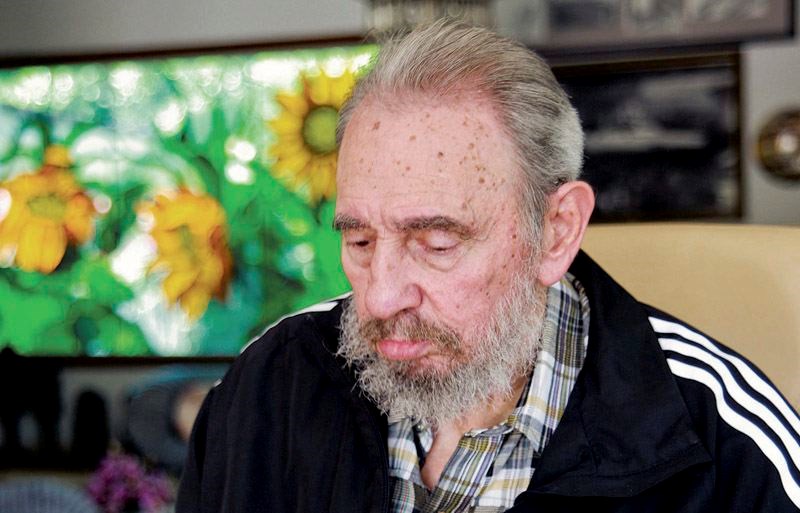Goodbye, Fidel!
On Nov. 25 at 10:29 p.m., Fidel Castro took his last breath, much to the sorrow of those who benefitted from his life's work - the citizens of Cuba. He was 90 years old and had held the responsibility of his citizens in his hands from 1959 until his illness in 2006 when he turned over the presidency to his brother. He was a benevolent dictator.
Justin Trudeau sent condolences to the Cuban nation on behalf of all Canadians, much to the chagrin of some opponents.
Back in 1959, Castro made the mistake of kicking out a non-benevolent, mafia-friendly dictator, Batista, who was supported by the U.S. He also made the mistake of being a Communist, though we are happy to deal with China, a one-party state that suppresses open political activity, expressing our concerns, maybe, about human rights while we build pipelines heading west, offshore factories, and buy Chinese products.
As for non-benevolent dictators, we seem to love them.
The U.S. solidly backed Saddam Hussein when he went after Iran, as they also did with the likes of Pinochet, Noreiga, Marcos, Mobutu and Duvalier. I doubt we ever bothered to remind them about human rights.
Obama kept Guantanamo, ramped up drone killings that were off target and against the wishes of other democracies such as Pakistan, sold over a billion dollars in arms to the Saudis who in turn gave those arms to IS and Al-Qaeda. Plus the Americans did some renditioning, a clear violation of human rights.
So bravo, Trudeau for not being a hypocrite.
Castro was good to his own people.
Castro's legacy started when, shortly after taking power, he financially supported women so they could stop prostituting in order to feed and house their children. He gave every citizen a ration book for food. True, the people weren't offered T-bone steaks every day or even once a week but the homemakers could sufficiently feed their family from the seven pounds of rice, one pound of beans, half a litre of cooking oil, one bread roll per day, plus small quantities of eggs, chicken or fish, spaghetti, and sugar each person was allotted monthly.
Castro also got rid of homelessness. First, he prioritized women with children and then worked his way through his citizens from the most needy to the least until everyone had a place to live. To do this, houses and apartments were confiscated from those who owned more than one residence. He also seized homes owned by those who had failed or refused to pay their property taxes. Many of these people were Americans. Castro offered to return the property if they paid the overdue taxes. Most refused to do so.
Starting in the mountains in 1961, Castro organized about a million people to be part of the literacy brigade. Their job was to build schools, train teachers and raise literacy, which at that time was between 25-40 per cent. Within two years, 96 per cent of the people could read and write at a functional level. Once basic illiteracy was wiped out, he offered free education to everyone, and anyone could study whatever they wanted.
He also outlawed discrimination, which included permitting black people entry to the Catholic Church although he did restrict services for everyone to one day a week. Mixed marriages were allowed and it was Raul Castro's daughter, Mariela who fought, demonstrated, lobbied and won rights for the LGBT society in the 1990s. Although they haven't obtained the right to legalized marriage, the anti-discrimination laws include gender identity. And they celebrate the National Day Against Homophobia!
It was the embargo that hurt the Cuban people, not Castro. The Americans disallowed their citizens and companies to do business or spend money in Cuba. Those who broke this law were subjected to prison terms of up to 10 years and/or a $250,000 fine.
The world traded in American currency and in Cuba, there was little to spare. Medicine was in short supply as were products such as shampoo, car parts, electronics and Western luxuries. I spoke with a publisher in Havana who said that due to the lack of cash, the government couldn't print enough books to supply every child in Cuba. The children had to share.
I also spoke with many medical doctors who pointed out that they couldn't make their clinics and hospitals as sparkling as tourists expected. Any spare dollars were put into new equipment, medicines and supplies so they could offer the best of medical care albeit without trimmings. Many Canadians choose to go to Cuba for surgery rather than wait the months and months it takes to receive the same treatment here.
But Canada and Europe recognized that the embargo had no political purpose except for revenge. French, German, Spanish and Italian governments built hotels in Varadero, a beach on the Caribbean. Their guests spent tons of much-needed money and the companies paid their taxes. Sympathetic countries also buoyed up Cuba's economy. When the Soviet Union collapsed and support was halted, Venezuela and China stepped in.
To counter this, the Americans passed the Helms-Burton law in 1996, which prohibits any president from lifting the embargo until Cuba has "legalized political activity and made a commitment to free and fair elections."
The Cubans might not have American styled elections but each community in Cuba democratically elects a person by secret ballot to represent them within their district. From these representatives, the provincial assembly is chosen for a two-year period. Finally, the 612 member national assembly is chosen for five-year terms, many from those elected to the districts. One deputy is chosen for each 20,000 inhabitants. Granted, the Castros are in control and the government follows Communist dogma but the representatives have some power to make changes.
So, rest in peace, Fidel. May your legacy continue for as long as we have a Cuba.
-- Vivien Lougheed, a Prince George author



